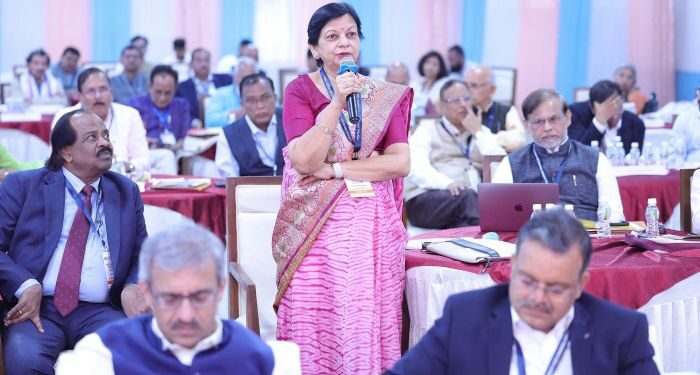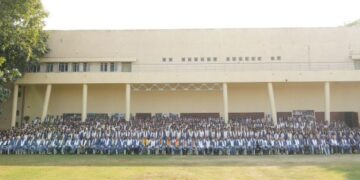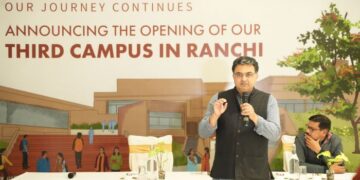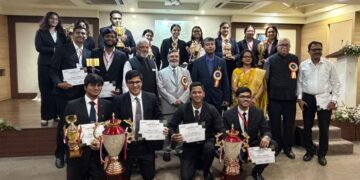The conclave attended by 50 Vice Chancellors of leading HEIs in its various sessions reviewed, assessed, and discussed strategies on the implementation of NEP 2020. It was mentioned that the key themes to be incorporated in the strategy should include: multidisciplinary integration of subjects, mainstreaming Indian Knowledge System (IKS), devising strategies for tech driven education to promote skilling and up-skilling, campus initiatives focusing on innovation and integration of technology with traditional values and conferences like VC’s conference should be organised in the individual university campuses.
One of the significant parts of the conference were the discussion held with Vice Chancellors who deliberated on key pillars of NEP 2020—access, equity, quality, affordability, and accountability—as they apply to institutional governance, academic innovation, digital learning, research excellence, and global engagement. The discussions were grounded in insights from their personal experiences of implementing NEP 2020 reforms in their own universities and learning from it.
The event was attended by Minister for Education, Dharmendra Pradhan; Minister of State for Education, Dr. Sukanta Majumdar; senior officials from the Ministry of Education and Vice Chancellors of Central Universities. The two-day event brought together a wide range of institutional voices, including the University of Delhi, Jawaharlal Nehru University (JNU), Visva-Bharati, Jamia Millia Islamia, Assam University, Banaras Hindu University (BHU), IGNOU, Nalanda University, Tripura University, Central University of Jharkhand, Central University of Kashmir, Hemvati Nandan Bahuguna Garhwal University, Tata Institute of Social Sciences, South Asian University and Kendriya Hindi Sansthan (KHS), showcasing the diversity and strength of India’s education ecosystem.
On the first day of the conference, discussions centred around core structural and academic reforms envisioned under the National Education Policy (NEP) 2020. The session on Understanding and Implementation of the National Higher Education Qualification Framework (NHEQF) and the National Credit Framework (NCrF), with a focus on the Four-Year Undergraduate Programme (FYUP), highlighted the shift toward flexible, multidisciplinary education and seamless academic mobility. The dialogue on the Future of Work focused on realigning university curricula with emerging global job roles and technological advancements to ensure industry relevance and employability. In the session on Digital Education, initiatives such as SWAYAM, SWAYAM Plus, and APAAR were discussed as critical tools for flexible learning pathways, multilingual e-content, and credit portability. The session on SAMARTH e-governance system stressed the importance of digital integration in strengthening university operations and transparency. Discussions on Promotion of Equity in Higher Education Institutions (HEIs) addressed the need to bridge regional and socio-cultural disparities, while the session on Education in Bhartiya Bhasha and Indian Knowledge Systems (IKS) explored how Central Universities can lead the integration of indigenous languages and knowledge systems into mainstream higher education, in alignment with the transformative vision of NEP 2020.
On the second day, the sessions turned towards innovation, quality assurance, global engagement, and capacity building, areas that support NEP 2020’s vision of transforming India into a global knowledge superpower by 2047. The session on Research and Innovation, which included discussions on the Anusandhan National Research Foundation (ANRF), Centres of Excellence (CoEs), and the Prime Minister’s Research Fellowship (PMRF), focused on strengthening institutional research ecosystems and nurturing interdisciplinary inquiry. The dialogue on the Ranking and Accreditation System explored strategies for improving institutional quality, transparency, and global standing through frameworks like NIRF and NAAC. The session on Internationalisation, with a focus on the Study in India programme and enabling regulations for Foreign Higher Educational Institutions (FHEIs) to establish campuses in India, reaffirmed India’s intent to become a preferred global education destination. Lastly, the session on Faculty Development highlighted the pivotal role of the Malaviya Mission Teacher Training Programme (MMTTP) in equipping educators with future-ready pedagogies and supporting continuous professional development. Collectively, these discussions are expected to catalyse systemic transformation across Central Universities, furthering the effective implementation of NEP 2020 in the years ahead.
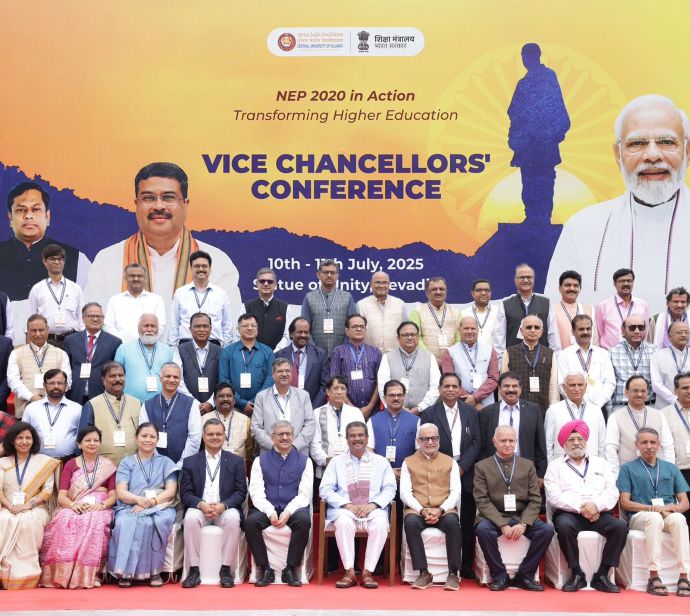 Dharmendra Pradhan in his inaugural address said in the last decade, India’s higher education ecosystem has undergone a fundamental transformation making it flexible, interdisciplinary, inclusive and innovation driven. He mentioned as a result, total student enrolment has touched 4.46 crore, a 30% increase since 2014–15, female enrolment has grown by 38%, and female GER now exceeded male GER, Ph.D. enrolment has almost doubled, and female Ph.D. scholars have grown by 136%, GER for Scheduled Tribes has increased by 10 percentage points, for SCs by over 8 points. This indicated the Government’s commitment to inclusive education and social justice. He also mentioned that as a result of positive policy initiatives 1,200+ universities and over 46,000 colleges have been established making India of one of the largest systems globally.
Dharmendra Pradhan in his inaugural address said in the last decade, India’s higher education ecosystem has undergone a fundamental transformation making it flexible, interdisciplinary, inclusive and innovation driven. He mentioned as a result, total student enrolment has touched 4.46 crore, a 30% increase since 2014–15, female enrolment has grown by 38%, and female GER now exceeded male GER, Ph.D. enrolment has almost doubled, and female Ph.D. scholars have grown by 136%, GER for Scheduled Tribes has increased by 10 percentage points, for SCs by over 8 points. This indicated the Government’s commitment to inclusive education and social justice. He also mentioned that as a result of positive policy initiatives 1,200+ universities and over 46,000 colleges have been established making India of one of the largest systems globally.
The minister highlighted the concept of Panch Sanklapa of NEP 2020 which would be the guideline for the VCs in their university gurukuls. The prominent themes being Next-Gen emerging education, Multidisciplinary education, Innovative education, Holistic education and Bharatiya Education. The Minister called upon the VCs to devise changes to implement the objectives of the academic Triveni Sangamam through the following objectives- Celebrating the past (India’s richness), calibrating the present (India’s narrative correction), and creating the future (India’s role in the global order). This would ensure understanding the past, uncovering the present and unfolding the future in the contemporary framework.
He emphasised that it was important to raise the GER in higher education to 50% by 2035 by taking definitive actions in critical areas such as redesigning curricula, building digital systems, training faculty and promoting multidisciplinary approaches. For attaining this objective, it was imperative for the Vice Chancellors to act as catalysts in shaping the mind-set and aspirations of students. Pradhan emphasised that universities must follow “Students-First” approach, students should be the centre of all our reforms as they constituted the core of our national strength for the future. He called upon the Vice Chancellors to ensure that the institutions being built for the future where skilled and future ready to promote ready work force and students were empowered to be job creators, social entrepreneurs and ethical innovators.
Dr. Hashmukh Adhia, Chancellor, Central University of Gujarat, in his address outlined comprehensively the “Six Principles” of karmayoga and emphasised the role and importance of Indian Knowledge Systems in the lives of individuals, society and the nation. He called upon the participants to practice the principles in achieving their goals and objectives in life.
Dr. Sukanta Majumdar highlighting the achievements of NEP 2020, in his address stated the integration of technology in education has been accelerated through platforms like SWAYAM. Over 295 universities allowed up to 40% of academic credits through SWAYAM courses. The platform was now issuing nearly 9 lakh certificates annually. He further stated NEP 2020 promoted multi lingualism as JEE, NEET, and CUET were being conducted in 13 regional languages. Due to the NEP 2020 policy initiatives, India made its best-ever performance in the QS World University Rankings 2026: A total of 54 Indian institutions were ranked which was a five-fold increase since 2015. The Academic Bank of Credits (ABC) – a cornerstone of student-centric learning – now has over 2.75 crore students registered and includes 1,667 higher education institutions, many of which are Central Universities.
Speaking at the concluding session, Secretary (HE), Dr. Vineet Joshi highlighted the key takeaways and expectations from the two-day conference. Implementing NHEQF, NCrF, and the Four-Year Undergraduate Programme is not just a policy priority—it is a structural shift. The transition must be institutionalised thoughtfully but without delay. We must prepare our students for the future of work by ensuring our curricula, pedagogy, and internships align with real-world skill demands. Platforms like SWAYAM and AAPAR must be embedded into the teaching-learning ecosystem. Credit transfer, blended learning, and digital inclusion are now part of core academic delivery—not add-ons. University governance must be made agile, data-driven, and citizen-centric. Tools like SAMARTH are enablers in this transformation, and I expect your active leadership in their adoption. Our higher education system must reflect the spirit of equity and inclusion. From admissions to faculty diversity and campus environment, inclusiveness must be measurable and visible in terms of participation opportunities and deliverables.


